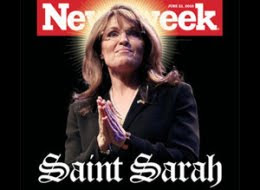Saint, Prophet or Just Palin

Kelly Baker
In some ways, the Christian right has always been a movement about women -- about what their role is in the family, in the church, and in the culture. That doesn't make it a women's movement, and that doesn't make Palin its leader. The movement's original sin, if you will, is that it is entirely predicated on the idea that America is a Christian nation and must be guided by biblical principles. And those biblical principles, as defined by the Christian right, preclude things like women's free agency -- choosing when and if to have children, choosing to enter ministry, choosing not to submit to her husband's spiritual authority, or choosing not to get married and have children at all.... But while Palin's not a feminist, she is a lightning rod for evangelical and Pentecostal women, because she gave them a fearless -- fearless in that she was unafraid so say whatever nonsensical thought popped into her head -- leader on the national stage.
I agree with Posner's assessment of the place of women in the Christian Right, but I want and need more historical context from both of these pieces. The debate over Palin's feminism strikes me as an older debate, as Posner notes, about the place of women in more conservative political and religious movements. How could women be feminists in movements that clearly don't seem to have their best interests at heart?! (Marie Griffith's God's Daughters is the best on this ambiguity, and Miller uses Griffith in her article.) The rhetorical move to include motherhood as the claim for political and religious authority is not new. In his White Protestant Nation (2008), Alan Lichtman labels this as "conservative maternalism" in which women affirm the "inherent differences between the sexes and women's special role in rearing children as healthy, moral, and productive citizens" (p. 19). Lichtman is not the first to note how this maternalism functions but I really like the label and his ability to show how this maternalist ideology and its embrace by conservatives can be traced to the 1920s (and likely before though Lichtman begins in the 1920s). (See also Burlein's Lift High the Cross, for a more theoretical approach to the gender ideology of the Christian Right, and Blee's Women of the Klan, for a full discussion of how Klanswomen used maternalist strategies).
Palin, thus, melds personal experience and political authority in a way that other conservative women have, which does not make her a replacement for Jerry Falwell. Rather, this makes her complementary to larger political and religious agendas of the Christian Right not a trailblazer. She affirms what this movement already believes about gender and provides a role model for the women that attend her speeches and pay for plates at fundraisers. Moreover, Palin's disapproval rating might be high, but she has a dedicated fan base that sport bumper stickers, t-shirts, her particular brand of glasses and buy her book and slots at fundraisers. Her celebrity does not signal a new spiritual mission of the Christian Right rather she just showcases the status quo in a flashier fashion.

Comments